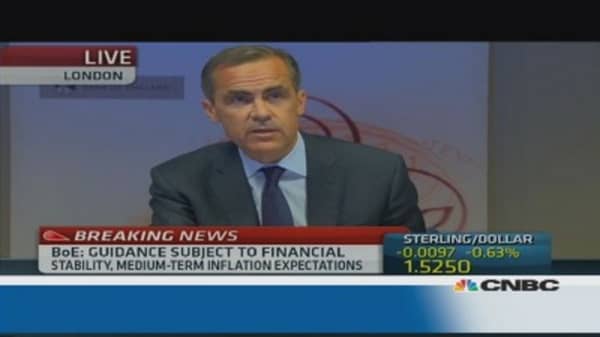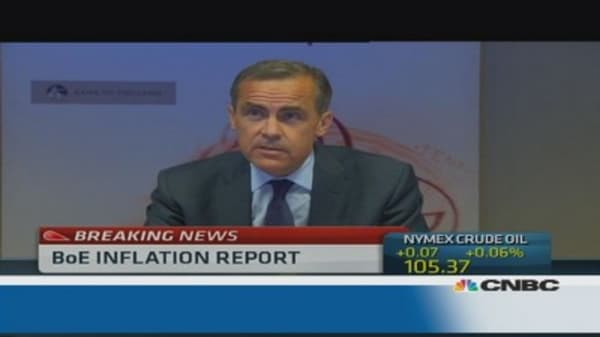The new governor of the Bank of England (BoE), Mark Carney, has announced that the central bank will not raise interest rates until U.K. unemployment hits 7 percent. In July, it stood at 7.8 percent.
The FTSE 100 turned negative following the news, while sterling rose to a one-and-a-half month high against the dollar, reversing earlier falls.
This guidance, similar to that issued by the Federal Reserve in the U.S., marks one of Carney's first departures from the reign of his predecessor, Mervyn King, who stepped down earlier this year. He made the announcement as part of the BoE's quarterly Inflation Report on Wednesday.
(Read more: Bank of England's Carney in the spotlight)
Carney said there are three other conditions or "knockouts" which would stop the BoE from changing rates: above-target inflation; unanchored medium-term inflation expectations and any threat to financial stability.
The former head of the Bank of Canada seemed cautiously optimistic on the U.K.'s economy.
He told reporters: "A renewed recovery is now underway in the United Kingdom and it appears to be broadening" and cautioned that the recovery is "weak" by historical standards.He added that he believes gross domestic product (GDP) in the U.K. will not hit its pre-crisis peak for another year.
"The MPC intends, at a minimum, to maintain the current exceptionally accommodative stance of monetary policy until economic slack has been substantially reduced, provided that this does not put at risk either price stability or financial stability," he added.
The BoE's monetary policy committee (MPC) predicted that annual growth will be 2.4 percent in 2 years' time, which will still be slightly below its historical average.
Carney has little room for maneuver with interest rates, which have been at a historical low of 0.5 percent for more than four years. Economists forecast they are likely to stay at this level for at least another year.
Opinion is divided over whether the new forward guidance policy will be positive for the economy. While it could give more certainty to British savers and lenders on issues like interest rates, it may also bring the BoE's credibility into question.
(Read more: Expect 'radical changes' from the Bank of England)
Follow us on Twitter: @CNBCWorld





